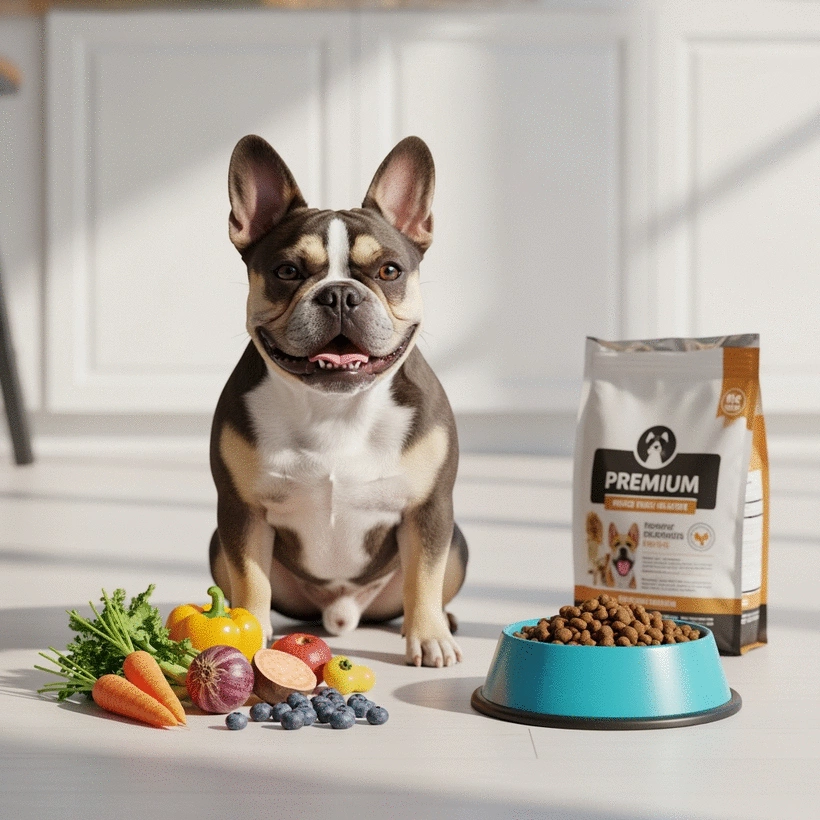Nutrition Tips for Australian French Bulldogs

As a dedicated French Bulldog owner, understanding the nutritional needs of your furry companion is more than just a chore—it's an essential part of ensuring their health and happiness. Did you know that specific dietary choices can significantly impact their overall well-being, especially in the unique Australian climate?
What You Will Learn
- French Bulldogs require a breed-specific diet tailored to their unique physical characteristics and health needs.
- Monitoring portion sizes is crucial, considering their smaller stature and potential for obesity.
- Incorporating Omega fatty acids in their diet can help mitigate skin irritations and promote a healthy coat.
- Regular veterinary consultations can provide tailored dietary recommendations and help identify any health issues early on.
- Utilizing feeding tools, such as calculators and logs, can streamline meal planning and ensure nutritional needs are met effectively.
Key Nutritional Considerations for Australian French Bulldogs
The following visual highlights the crucial factors influencing the dietary needs of French Bulldogs, categorized by their physical attributes, health considerations, and specific dietary components.
Physical Characteristics & Feeding
- •Size & Weight: 9-13 kg, smaller portions
- •Muscle Mass: High protein diet
- •Temp. Sensitivity: Avoid overheating foods
Health Issues & Nutritional Implications
- •Obesity: Monitor calorie intake
- •Skin Conditions: Omega fatty acids
- •Digestive Issues: High-fiber diets
Breed-Specific Diet Components
- •High-Quality Protein: Muscle development
- •Healthy Fats: Coat & skin health
- •Moderate Carbs: Energy without weight gain
Essential Feeding Habits
- •Consistent Schedule: Regulate digestion
- •Monitor Weight: Avoid obesity
- •Mix Wet/Dry Food: Enhance palatability
Understanding the Unique Nutritional Needs of Australian French Bulldogs
As a proud French Bulldog owner, I’ve delved into the intricacies of what keeps our furry friends healthy and happy. One crucial aspect is understanding their unique nutritional needs. The way we feed them can significantly impact their overall health, especially considering the unique lifestyle and climate of Australia.
French Bulldogs are known for their muscular bodies and compact structures, which means their dietary requirements can differ from other breeds. It’s essential to recognize these characteristics as we explore their nutritional needs! For more in-depth information, consider checking out our guide on French Bulldog Diet Tips for Aussies.

Physical Characteristics That Influence Feeding
The physical traits of French Bulldogs play a vital role in determining their nutritional requirements. For instance, their short snouts can lead to unique feeding challenges. This characteristic can affect their ability to eat quickly or even the types of food they can enjoy comfortably.
- Size and Weight: French Bulldogs typically weigh between 9-13 kg, so their portion sizes need to reflect their smaller stature.
- Muscle Mass: Their strong, muscular build requires a diet high in protein to maintain their strength and energy levels.
- Temperature Sensitivity: Given Australia's warmer climate, it’s crucial to provide food that doesn’t overheat their systems or cause digestive discomfort.
By tailoring their diet to accommodate these physical traits, we can enhance their well-being and energy levels. It’s like finding the perfect balance between what makes them thrive and what they enjoy!
Common Health Issues and Their Nutritional Implications
French Bulldogs are prone to specific health issues, and their nutrition can play a role in managing these conditions. For example, many face challenges such as obesity, skin irritations, and digestive problems.
- Obesity: This is a significant concern for Frenchies due to their love for food. It’s vital to monitor their calorie intake and adjust their diet accordingly.
- Skin Conditions: Many French Bulldogs experience skin allergies. Foods rich in Omega fatty acids can help combat this issue.
- Digestive Issues: Given their brachycephalic nature, some French Bulldogs may struggle with digestion. High-fiber diets can promote better gut health!
Recognizing these health implications allows us to make informed decisions when choosing the right food for our beloved pets. They rely on us to provide the best possible nutrition! For a comprehensive look at common health concerns, read our article on French Bulldog Health Issues Explained.
Breed-Specific Diet: Tailoring Nutrition for Optimal Health
A breed-specific diet is essential for French Bulldogs. This means focusing on food that meets their unique needs rather than a one-size-fits-all approach. It’s all about understanding their dietary preferences and necessary nutrients.
- High-Quality Protein: Look for dog foods that list meat as the first ingredient to support muscle development.
- Healthy Fats: Ingredients like fish oil can promote a healthy coat and skin.
- Moderate Carbohydrates: Ensure a balanced intake of carbs to provide energy without excess weight gain.
By choosing the right mix of ingredients, we can ensure our French Bulldogs live long, healthy lives. It’s rewarding to know that our choices directly impact their happiness and quality of life!
Pro Tip
Did you know that incorporating a variety of protein sources can greatly benefit your French Bulldog's diet? Try rotating between chicken, beef, and fish to provide a well-rounded nutrient profile. This not only keeps mealtime interesting for your pup but also helps to ensure they receive all the essential amino acids they need for optimal health!
Summarizing Key Feeding Practices for Australian French Bulldogs
Feeding your French Bulldog is about more than just filling their bowl with food! It's essential to understand their unique nutritional needs and to develop a consistent feeding routine. After diving into various aspects of dog nutrition, here are the key takeaways to remember when it comes to feeding your Frenchie.
- Prioritize high-quality, breed-specific dog food that meets their specific needs.
- Adjust portion sizes based on their age, weight, and activity level.
- Consider any food allergies or intolerances your dog may have.
- Maintain a regular feeding schedule to help regulate their digestive system.
These practices not only ensure your French Bulldog gets the right nutrients but also promote a happy, healthy life. Just like I learned through my journey with my own Frenchie, consistency really is key!

Essential Takeaways on Nutrition and Feeding Habits
As we wrap up this section, let's take a closer look at some essential feeding habits that can benefit your French Bulldog:
- Offer meals at the same times each day to establish routine.
- Monitor their weight regularly to avoid obesity.
- Incorporate a mix of wet and dry food to enhance palatability.
- Stay informed about any breed-specific health concerns related to diet.
By focusing on these practices, you can create a solid foundation for your Frenchie's overall health and well-being. Remember, every dog is unique, and understanding their individual needs is an integral part of being a responsible owner!
The Importance of Consulting with Your Veterinarian
Your veterinarian is your best ally in ensuring your French Bulldog thrives! Regular check-ups can help identify any emerging health issues and provide tailored dietary recommendations. I always suggest discussing your Frenchie's diet during vet visits to ensure it aligns with their health profile.
- Ask about specific food brands that suit your dog’s needs.
- Discuss any dietary changes or supplements you’re considering.
- Inquire about weight management strategies tailored to your Frenchie.
- Seek advice on recognizing signs of food allergies or sensitivities.
Having these conversations can make a significant difference in your dog’s health journey. It’s a partnership that ensures your furry friend gets the best care possible! For more details on veterinary care, check out our Vet Tips for Your French Bulldog.
Understanding Feeding Tools for Better Meal Planning
To help streamline your feeding process, utilizing tools can be incredibly beneficial. Here are some helpful resources that I recommend:
- Feeding charts: Use these to determine portion sizes based on weight and age.
- Meal prep containers: These help keep food fresh and organized.
- Food logs: Keeping track of what you feed your dog can help identify patterns and preferences.
- Apps: Many mobile applications can assist in meal planning and tracking your dog’s nutrition.
These tools can enhance your feeding practices and ensure that you’re meeting your French Bulldog’s nutritional needs effectively!
Interactive Tools for Personalized Nutrition Planning
Feeding Calculators: Tailoring Portions to Your Dog's Needs
Feeding calculators are a fantastic way to customize your French Bulldog's diet! They take into account factors like age, weight, and activity level, helping you determine the right portion sizes for their unique needs. I’ve used them to adjust my Frenchie's diet, ensuring he always has enough energy for playtime while maintaining a healthy weight.
- Enter your dog's weight and age for personalized recommendations.
- Adjust portions based on activity level.
- Reassess regularly as your dog grows or changes.
Using these calculators can simplify meal planning and make feeding time more enjoyable for both you and your furry companion!
Encouraging Community Engagement and Sharing Experiences
One of the best ways to enhance your French Bulldog's feeding journey is by connecting with other dog owners. Engaging with the community can provide a wealth of knowledge, tips, and shared experiences. I invite you to share your stories and insights on the French Bulldog Guide's platform!
- Join forums or social media groups dedicated to French Bulldogs.
- Participate in local meet-ups or dog events.
- Share your favorite recipes or feeding hacks with fellow owners.
- Learn from others about their successes and challenges in feeding.
Together, we can create a supportive environment for all French Bulldog lovers, helping each other raise happy and healthy pets!
Frequently Asked Questions About French Bulldog Nutrition
Q1: What are the primary nutritional considerations for French Bulldogs in Australia?
A1: French Bulldogs in Australia need a breed-specific diet that accounts for their size, muscle mass, and temperature sensitivity due to the climate. Their diet should be rich in high-quality protein, healthy fats, and moderate carbohydrates to support their unique physical characteristics and energy needs.
Q2: How does a French Bulldog's physical characteristics influence their diet?
A2: Their compact size (9-13 kg) requires smaller, controlled portions to prevent obesity. Their muscular build necessitates a high-protein diet for muscle maintenance. Additionally, their brachycephalic nature and temperature sensitivity mean food should not cause overheating or digestive discomfort, making the type and temperature of food important.
Q3: What common health issues can be managed through diet in French Bulldogs?
A3: Diet can help manage obesity (by monitoring calorie intake), skin conditions (with Omega fatty acids), and digestive issues (with high-fiber foods).
Q4: Why is a breed-specific diet important for French Bulldogs?
A4: A breed-specific diet ensures that their unique needs are met, focusing on the right balance of high-quality protein for muscle development, healthy fats for coat and skin health, and moderate carbohydrates for energy without excessive weight gain. This tailored approach helps them live long, healthy lives.
Q5: How can I ensure my French Bulldog is getting the right portion sizes?
A5: Utilize feeding charts or online feeding calculators that consider your dog's age, weight, and activity level. Regularly monitor their weight and adjust portions as needed. Consulting with your veterinarian can also provide tailored recommendations.
Recap of Key Points
Here is a quick recap of the important points discussed in the article:
- Prioritize high-quality, breed-specific dog food that meets the unique nutritional needs of French Bulldogs.
- Adjust portion sizes based on your dog's age, weight, and activity level to prevent obesity.
- Incorporate ingredients rich in Omega fatty acids for skin health and consider high-fiber diets for digestive issues.
- Maintain a regular feeding schedule to support digestive health and overall well-being.
- Consult with your veterinarian for tailored dietary recommendations and to monitor your dog's health.









